mali 7: timbuktwo
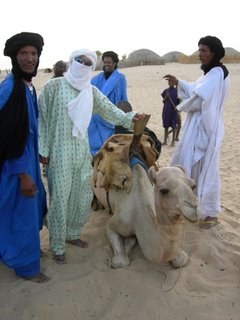
alex examines his mount
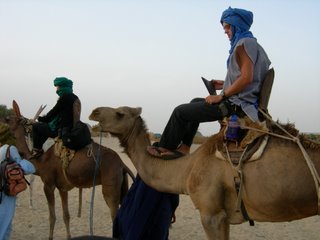
easy there, boy!
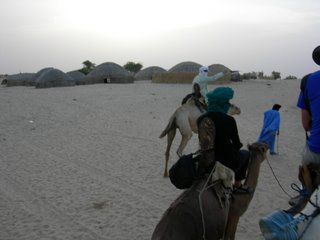
we set off as the sun was setting, after a lengthy dispute about our return time the next day; in order to get a taxi out of timbuktu to get to douentza - a 7 hour 4x4 trek through the desert (well, the plains, anyway, but on a dirt road) - we would have to leave early in the morning - or so we were told; this meant, we would have to return earlier than we anticipated, something our "guide" didn't think was in our contract, not that it existed. not that he was really even our guide, because he didn't even come with us. but the rest of that story waits for tomorrow. the interesting thing about the camel trek was that while we rode the camels, the tuaregs walked, which meant that we could only go as fast and as far as the tuaregs wanted, which was, albeit, a fairly good clip. but the time constraint that we imposed meant that instead of going way out into the desert, we would only be going out a short distance - this is also because we were late to depart and the sun was falling.
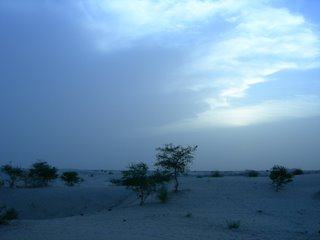
and it was very beautiful;
next time: at the tuareg encampment
mali 7: timbuktu
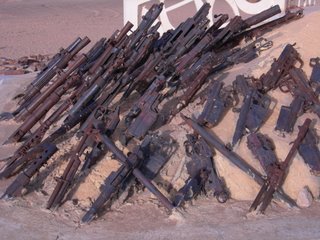
alex and i woke up early to wander the town before the desert heat. the hotel at which we were staying - desert paradise, or something - was literally on the edge of town, before the brick buildings disappeared and a slim band of tuareg skin tents separated us from a practical infinite desert to the north. at this border, a monument, commemorating the cease fire between tuareg rebels and the malian government, called the flame of peace - at this site, they burned 3000 firearms - those that survived were cast into the cement as a reminder.
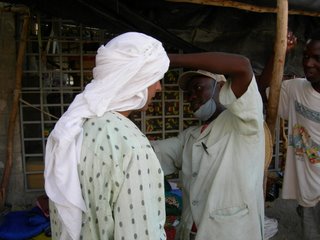
alex gets fitted for a turban - from this point onward, he would constantly be considered muslim, which lent us great credibility!
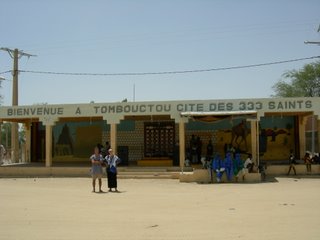
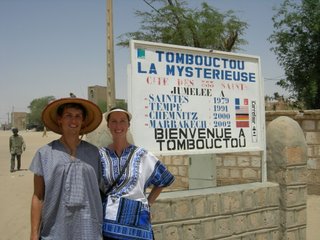
i'm not sure which of these slogans is better: "timbuktu, city of 333 saints"? or "timbuktu the mysterious"? we spent a good deal of time trying to figure out just exactly what was the mystery of timbuktu - eventually solving that the mystery was, why does anyone come to timbuktu, this dusty town on the edge of the desert, full of thieving tuaregs? no - actually, i think those are precisely the reasons.
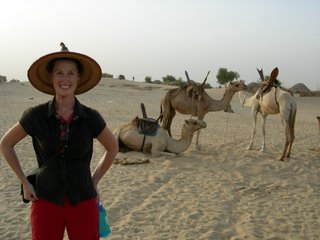
this night we were going to ride camels out into the desert and spent the night at a tuareg encampment, and so had to complete our day of sightseeing by 4pm, at which time we would meet our tuareg guides. this is when things started to get really cool.
mali 6: disembarkation
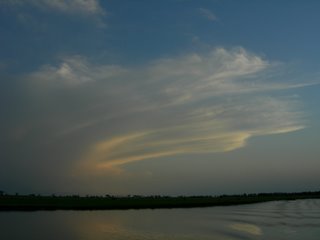
great sunrises on the river
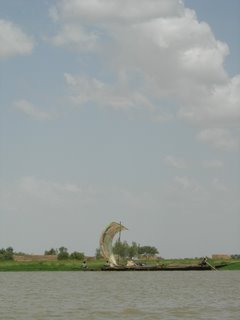
once we got further down river, we began to see some sail-pirogues, which were a change from the pervasive hand-poled pirogues.
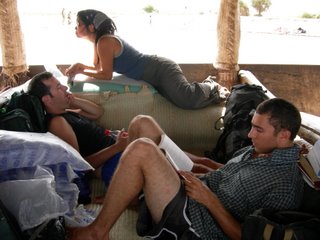
it more or less conveys the passage of time on the boat - cramped quarters (although relatively spacious) - reading books, watching the scenery, suffocating from the
heat, trying to catch up on sleep, etc.
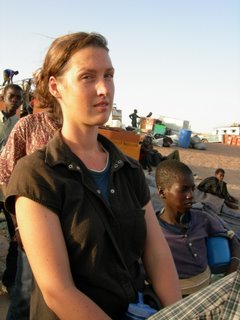
after 3 days on the river, we finally arrived in kourioume, which is the port for timbuktu - my guess is that timbuktu actually used to be on the river, but it changed course and now the river is about 20k away. as the look on sarah's face suggests, we were pretty exhausted when we got there, and still we had to haggle over the ride to town - out of principle; who was going to pay the 50 cent baggage fee? not me!
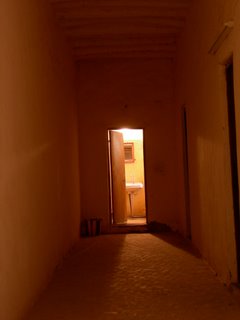
we managed to pick up several new tuareg "friends" during the brief journey form kouriome to the auberge where we were staying; once some new white people roll into town, every single person finds out about it and the "guides" and salesmen will wait outside your hotel from 6 in the morning for you to emerge and, hopefully, hire their services or buy their wares. man - we thought the sell in mopti was tough, but the real claws came out once we got to the desert. eventually, you just had to insult whatever tuareg was following you so he would leave you alone. this was somewhat nervewracking, as their wares mainly consisted of knives. but unlike the mopti sell, which was hard up front, the tuaregs are silky smooth in their approach, with lots of
smiles below blue-turbaned heads. but the hotel was something of a sanctuary, as they would stop following you at the gate. the walls were thick and they cut the heat.
mali 5: on the boat
this is a montage of the second day of the journey, one of languid reading and attempted sleeping. we were mocked by the rest of the boat for putting up mosquito nets, although the real problem, as previously mentioned, was the total lack of thought that went into our sleeping arrangement. even though we had maybe 3 times as much space as the average african on the boat, i reckon we got about 1/3 the sleep. eventually, alex and i had to end of sort of spooning, on opposite sides of a millet sack, because we were sharing a mosquito net. on the flip side, no sleep meant waking up for an amazing sunrise.
it was on the afternoon of the second day that we saw the hippos just off the side of the boat - i couldn't get my camera out in time to photograph them, but there were 3 or so paddling around, surfacing, submersing, and it was very cool. everyone else was excited as well, i think.
we kept putting into small towns along the way, mainly to pick up passengers although occasionally to offload some cargo. the terrain began to get more and more sandy as we went north, going from very green rice fields to desert down to the waters edge. it was crazy going up this river, and having the desert on all sides, and then seeing someone walking along the riverbank in the heat of the day in the middle of nowhere. or sometimes we would see a pirogue miles from any river town. there were some fishermen, checking their lines, as well.
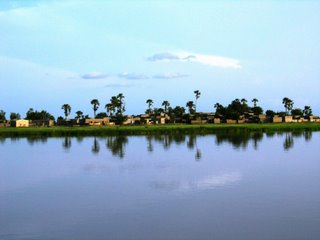
1. a town we passed that looks like an oasis.
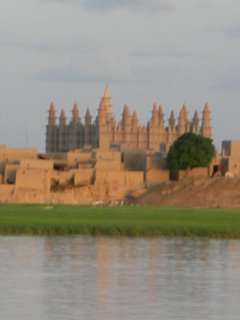
2. again, a town in the middle of nowhere and a tremendous mud mosque towering over it.
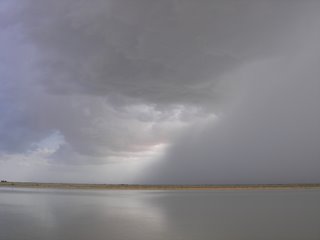
3. as you say from yesterday, we could climb up on top of the boat, which was a nice place to be - i think we got special treatment for being white - also, we made a ritual offering of tea and sugar to the chef du bateau who had the pimp cabin up in the front of the boat - because none of the other passengers were up on top of the boat at all. but it was a great place to see the river, get in the sun a little bit, escape the smell of the cooking fires. but on this day, just after we got up on top, the crew got frantic and were like, get down, get down and off on the east bank we saw the sand begin to kick up and the sky darkened along the fault line of an approaching storm, which moved so fast that we barely had time to swing down from the roof before it hit, where 30 seconds earlier it had been clear and sunny. unfortunately, my shorts and my kenyan blanket were drying from a previous rainstorm and got blown into the river by the sudden wind. when the storm hit, they battened down the hatches, such as it was, by unfurling the tarpaulin down the sides of the boat, completely shutting it off from the daytime - we were about to suffocate from the smoke when, in the process of bringing the boat to the lee side of the river, our captain promptly ran us aground. so, a bunch of people jumped out into the river with a tree trunk and levered the boat off the sand bar in the middle of the pouring rain and in a second the rain ended and we kept moving.
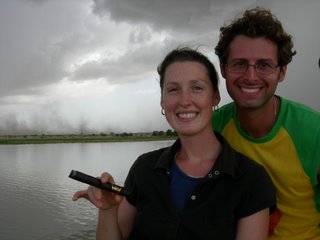
4. this is a good posed picture we were taking before we noticed the tornado forming behind us - (!)
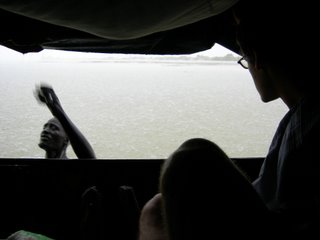
5. and the first mate up to his chest in water, yelling at people to close the tarps and simultaneously calling for volunteers to help lever the boat. chris, my sister's boyfriend, obliged, much to the amusement of all the africans.
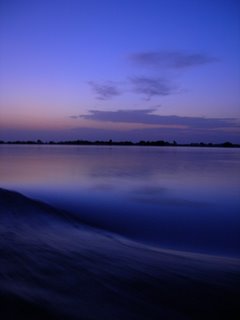
6. once the storm cleared, it left some amazing sky behind.
mali 4: embarkation from mopti
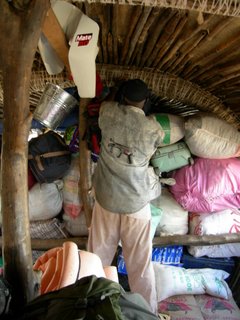
so, the next three days in the series sort of blend together, as we spent them all on the aforementioned cargo pinasse in an area about 10' by 6' full of cement and millet sacks. in theory, the grain sacks are moldable and, carefully laid as they are, create something of a flat floor surface upon which you can sleep, eat, etc. in reality, they are a treacherous geography of crevices and pits in which you are constantly stepping and, when sleeping, rolling, which forces your body to take the same kinks as the gap between the millet sacks. so, one of the reasons why all the days blend together, besides the obvious fact that the river scenery was pretty consistent, is that i didn't get any sleep the whole time. but it's all good, because this guy had an automatic weapon stiched to the back of his jean vest.
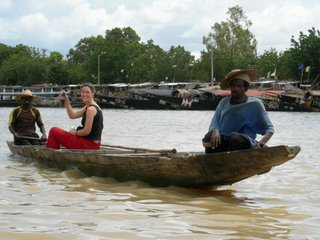
so, when we booked passage on the pinasse, the touts (or travel agents, such as they were) assured us that this was the only boat leaving tuesday, which is what we needed, and further warned us that the boat would be full and leave at 10am sharp. so, we had to get up early, get into mopti and buy supplies, including cases of water satchets. well, i don't know why we listened to this warning in a part of the world where time literally has 0 meaning, at least as we understand it by DC standards. at least we didn't miss the boat. i mean, we didn't miss it by a long shot. i think we set off sometime past 3 pm, which, all things considered, wasn't too bad. mainly, it gave sarah ample time to flag down a passing pirogue, and get him to take her straight from the side of our boat to the bar across the harbor for cold cokes.
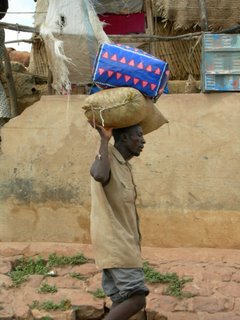
loading the boat was interesting, because it, like everything, is done by manual labor. they started off running a plank into shore up which people could walk without getting wet - then, because no one else profits from the plank, they pulled it in and all those pirogues swept into the breach, maybe five deep between the boat and the landing. so, now you either had to walk in water up to your chest and hoist yourself up into the pinasse, or you could pay each of the intervening pirogues like 5 cents to allow you to step in their boat and cross. in this context, people were loading these 100kg sacks of millet, motorcycles, sacks of charcoal, foam pads, luggage, braziers full of hot coals, and various other things.
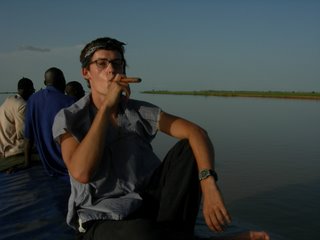
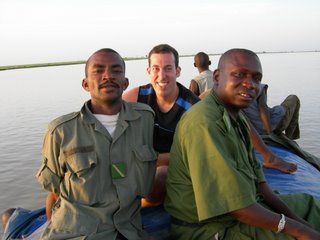
eventually we got underway, and celebrated by climbing up on the roof of the boat and smoking a cigar. once out of mopti even a little distance, the scenery was amazing, very green, punctuated by small mud towns and people in small boats. on the roof of the boat, we made friends with the gendarmes, who told us, in confidence, that they had stashed some automatic weapons on board to protect the boat in case of any pirates. so, when they asked for by address so that we could become penpals, i actually gave them the address of the republican flophouse. justin, who got sandwiched, may not have had such a ready excuse.
mali 3: daytrip to djenne
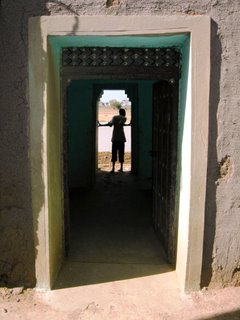
djenne's an old town with lots of great muslim architecture, all in mud. it has a great big library of islamic texts and many large mansions as well, all of which bear windows and doors in the moroccan style - heavy wood with ornate metal fastenings and embellishment, for the unsafe times.
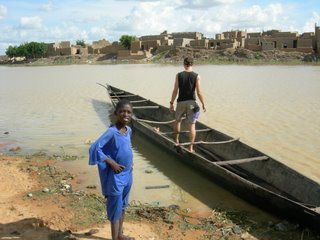
one of the neat things we did in djenne was take a pirogue across the river (djenne is on an island, although we heard that during the dry season there is sometimes a land bridge to the mainland) to one of the small bozo ethnic group fishing villages. one of the reasons it was fun because the pirogue might sink at any moment!
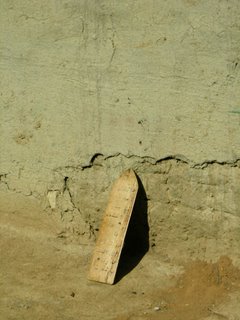
once back from the pirogue, we went walking through the old quartier of djenne, much like we had in mopti - the sight of a group of white tourists in the neighborhood was probably rare enough - it would be like seeing a bunch of people exploring the alley in front of casa quirk-cantrell and taking pictures - but i found the old quartier fascinating - djenne, and mopti before, are medieval in their design, which basically means no design at all - houses are piled on top of each other and streets are narrow and twisting. and then you would walk through this shoulder-width alley and stumble into a square shaded by a large tree, in front of the chief's compound or something. there were also many koranic schools, children seated in a noisy room writing in arabic on wooden tablets.
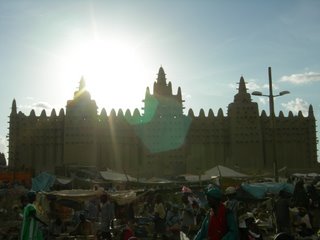
4. djenne, a few hours south of mopti along the river, is known for its large mud mosque; but i think it should also be known for its market, which was large and very lively. we got there pretty early in the morning and the market was already super hopping; so, we had as yet no idea what the day portended.
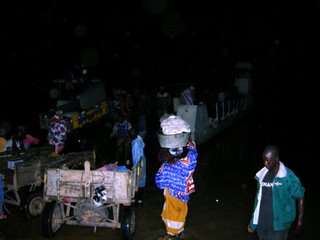
5. when we tried to leave djenne, we did our usual negotiating game at the taxi gare in front of the mosque. but there was an air of desperation as we discovered that only one taxi was going back to sevare, and it wasn't leaving anytime soon. we eventually agreed to each pay two places in the taxi to allow it to leave earlier. but somehow, we were oblivious to the fact that
it was market day in djenne
that djenne was basically on an island when the river was up
that we had crossed a ferry to get over
and that it was getting dark.
the combination of these things meant, of course, that everyone who had come to town for the market would be trying to get off at the same time; and it began to rain as if to remind us how poorly we had planned.
by the time our taxi finally left, and finally got to the ferry, there was long line of cars, trucks, and mule carts waiting to cross. the loading was intriguing: when the ferry pulled up to the shore (about 10m out) horsecarts and travelers on foot plunged recklessly into the river in an attempt to get on it. each ferry crossing took about 30-45 minutes one way; we were in for quite a wait.
drivers and drovers settled in around fires being lit by the river side; before long, the fires were the only source of light short of the neon blink of mobile phones. a crush of horse carts waiting at the water's edge to get on the ferry - thinking that the ferry counldn't possibly run late enough to get everyone across, we nervously planned to encamp on the riverbank. not entirely unjustifiably, in fact: just before the light died completely, the ferry came over to our side, picked up a massive truck full of goods and people, some horsecarts, etc. and started to pull away from the shore. it got like20 feet out and seemed to founder. the engines killed. it rotated listlessly, leaning heavily to one side - and it looked like it was drifting down the river; well, so much for getting back to sevare!
we weren't very optimistic about the prospect of the ferry being fixed right then, given how late it was. but, it turns out, the ferry was just turning around, after it had already left the bank, to pick up some government functionary who had to get across the river
right now. yet even as we cursed the inequity of elite privilege, i confess the continued operation of the ferry was quite a relief. when it came to our turn to cross, a few hours later and very latedark, we went in two stages: sarah, winnie, justin and i waded onto the ferry while chris and alex waited with the taxi, just unable to fit on this go. the ride across was smooth, and we quickly slipped out of side into the middle of the river; it was only a few hundred metres, but as soon as you left sight of the encampment around the bend, the water spread out infinitely in all directions; the captain and crew used a flashlight code to navigate, which was quite impressive in its efficacy.
alex fell in the river when he was trying to get on the ferry, which was funny. well, until we realized this his camera didn't work any more. we found this out after waiting for alex and chris some hours on the other side of the river, convinced the ferry had decided to stop running. it was a beautiful night, to sleep by the river bank beneath a tree on a mat. but no: they arrived, we left, and the ride back to sevare was nervewracking as only a high speed race through the middle of the night with scant headlamps on bad roads can be.
mali 2: mopti, city of la griffe
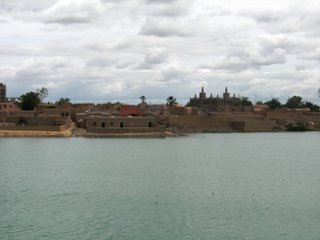
1. mopti is sort of like a regional capital, a beautiful city situated on an inland delta of the niger river - the old quarter streets snake among substantial mud-brick mansions and dilapidated mud-brick compounds. the new quarter port is extremely active with small hand-poled pirogues and larger, motorized pinasses. besides walking around the town, we were in mopti to negotiate passage by riverboat to timbuktu, a 3 day journey.
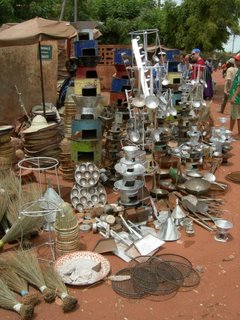
whereas most african towns (well, small ones) have one market day per week, mopti is a daily center of commerce, everything from slabs of salt caravanned from the sahara by camel to more mundane forged metal cooking implements. in mopti, as everywhere in africa, prices are not fixed, but fluctuate according to relationships and bargaining fierceness; there was a floor price for white people which we could never negotiate below - they would rather lose the sale. it was exhausting but sort of fun.
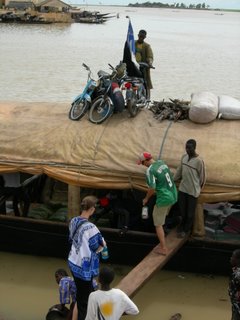
we went to examine the boat that was leaving the day we wanted (tuesday) for timbuktu - it seemed like a pretty good deal - three days of transport, including meals, and the six of us would get a whole "compartment" that normally seats about 20 people. of course, the boat wouldn't leave until it was full of cargo, which at this point it is not. they use these boats to transport largely millet in huge 50kg sacks and bags of cement. these would be loaded in the hull up to the gunwales and upon them we would sleep. sacks of millet - cozy!
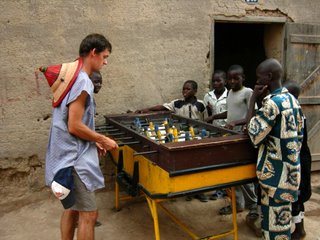
after we negotiated the boat, we took some time to wander the old quarter, home to the grand mosque and a quartier of large mansions. like DC, the wealthy live shoulder to shoulder with the destitute. we also took time out to school some little kids in foosball.
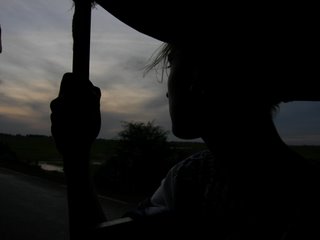
we left mopti in the evening, content with our plan to travel to djenne on the morrow and return to catch the boat to timbuktu the subsequent day. at this point, we were doing ok: we were staying at an inn run by a former missionary who harbored colonial aspirations - but, he was attuned to the health needs of foreign travelers, and made us mexican food and indian curry, all you can eat, for about 10x the price of african food - but, he had a pool. and it was worth it!
mali 1: ouagadougou to sevare
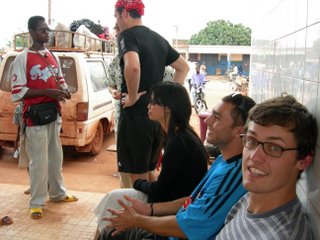
taxi stand at ouahigouya: it's about the middle of the day, and
we've been traveling since 6 in the morning on a bus. now, because we
heard rumors that roads were washed out due to rain, the bus has
declined to continue further and we have to catch the bush taxi!
that's our taxi in the background, a mini van which will eventually
hold 16 people + gear.
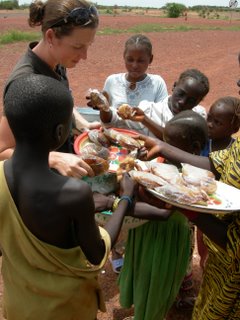
sarah beset by vendors at the burkina/mali border. the
border was interesting, because the burkina and mali checkpoints are
about 20km away from each other, making the land between them
something of a no-man's land (it was all desert anyway). the frontier
itself is a mud shack in the middle of nowhere, where girls presumably
from nearby villages hang out all day to sell peanuts, bananas,
sorghum doughnuts, etc. to passersby.
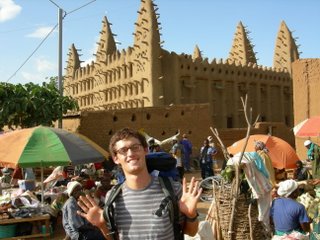
the mosque in koro, our second waypoint on the way to mali and our
first stop in mali itself. this is the first of many mud mosques we
would see. in koro, we negotiated with a guide for a later stage of
the trip, not quite sure if he actually was who he said he was.
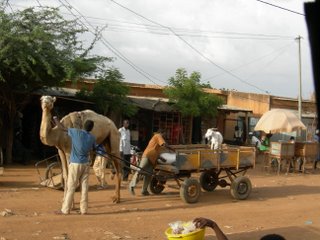
already, things were somewhat different that we were used to.
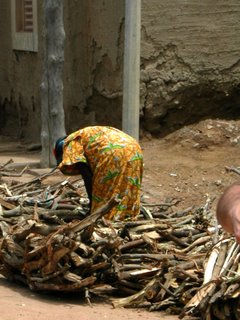
a firewood vendor along the side of the road. one of the things
that makes traveling slow is when the driver of the bush taxi decides
he needs some charcoal or firewood and pulls over capriciously in this
or that small town. we ended up making it into sevare at about 10pm,
16 hours after we left ouaga.








































